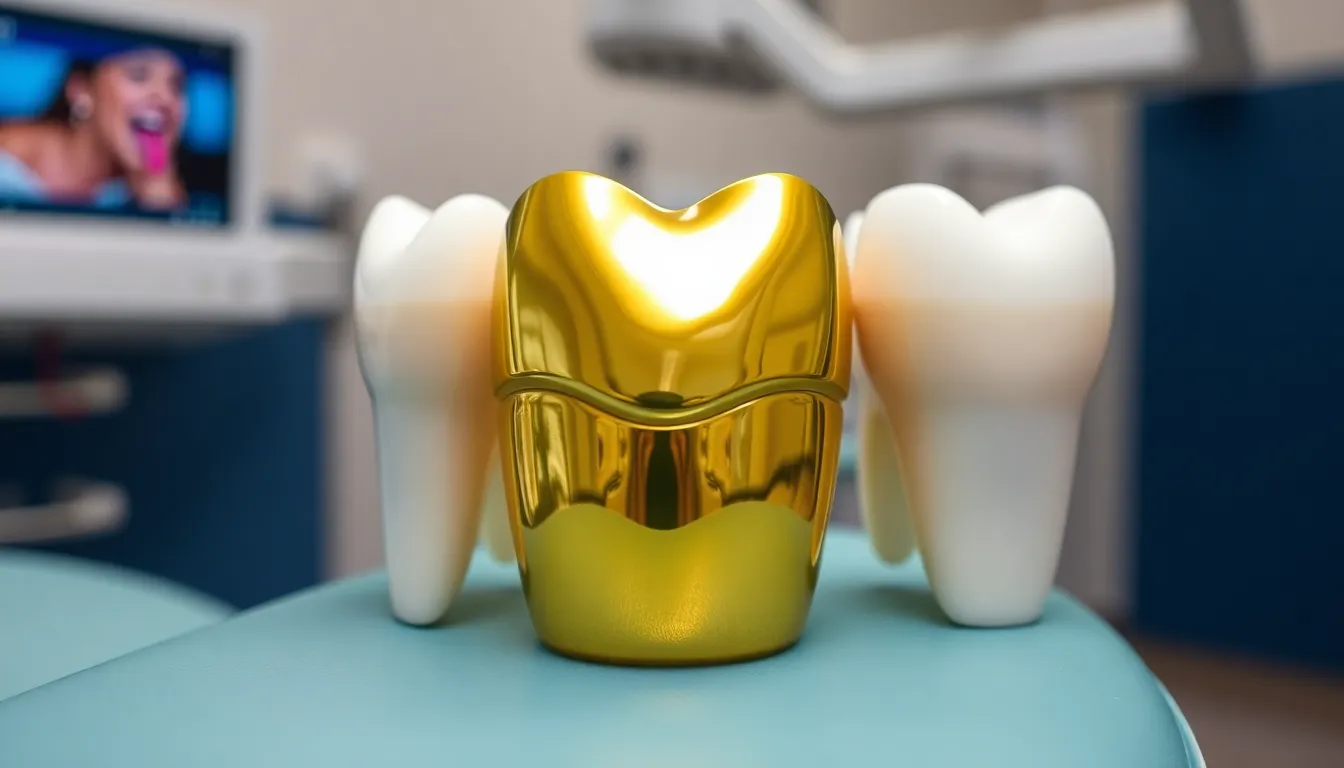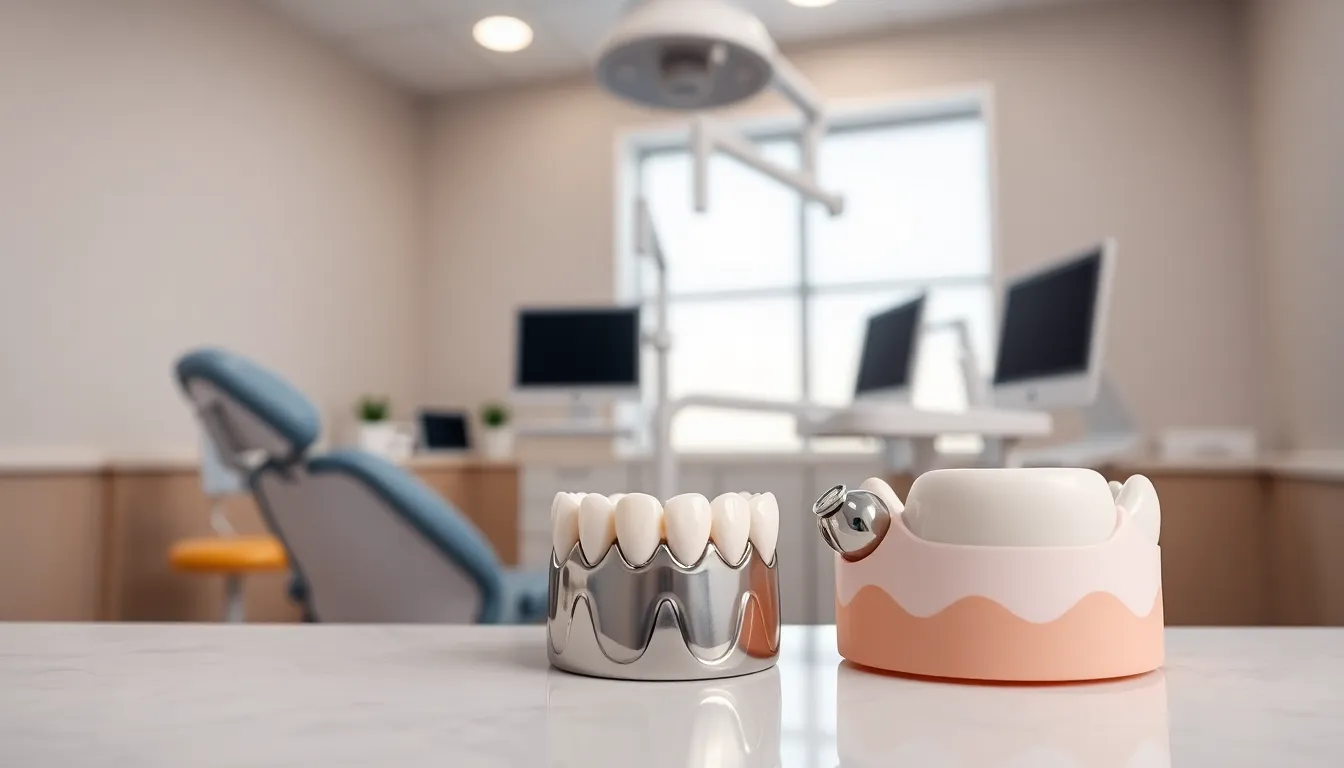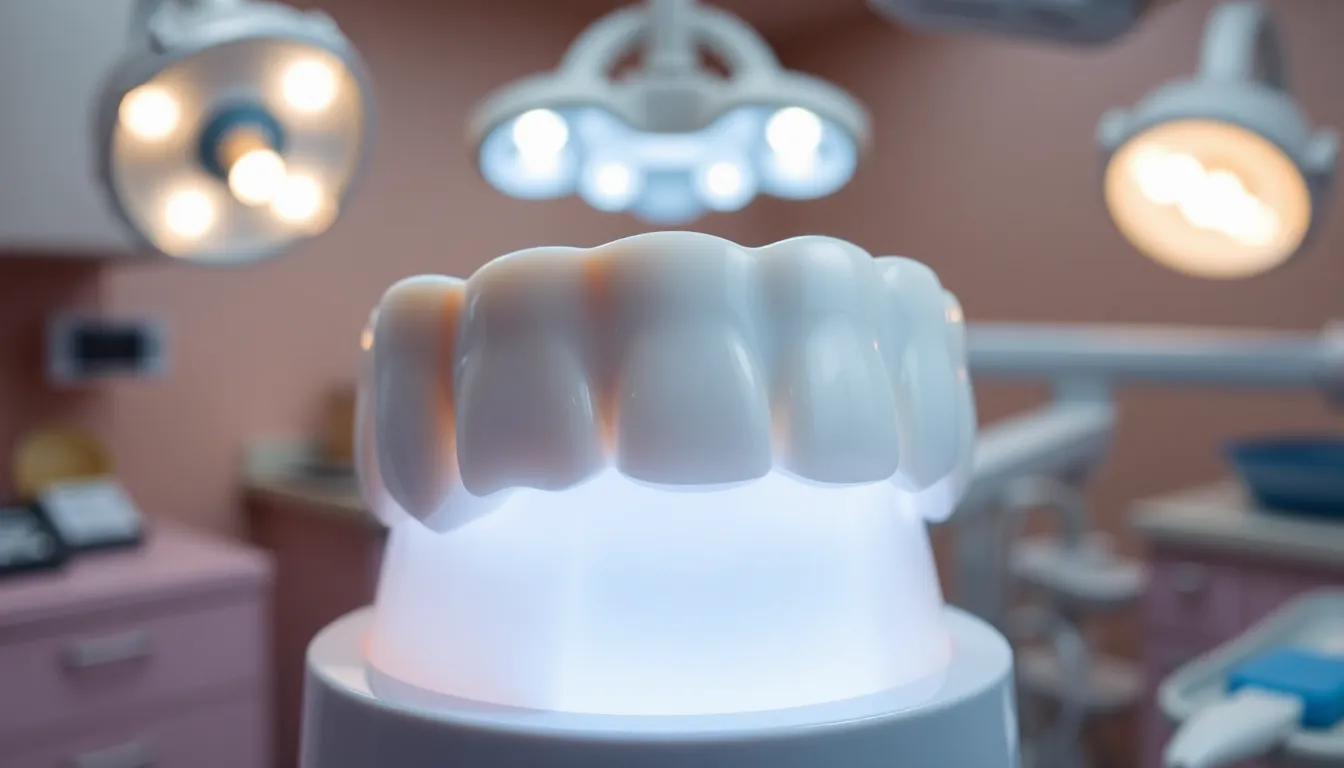A crown for a tooth is more than just a dental accessory; it’s a crucial solution for restoring damaged or decayed teeth. This custom-made cap fits over the entire tooth, providing strength and protection while improving its appearance. Crowns can be made from various materials, including porcelain, metal, or a combination of both, allowing for a blend of durability and aesthetics.
Understanding the purpose and benefits of dental crowns can help individuals make informed decisions about their oral health. Whether it’s to enhance a smile or to support a tooth after a root canal, crowns play a vital role in maintaining dental function and health. As dental technology advances, the options available for crowns continue to evolve, making them a popular choice among patients and dentists alike.
Table of Contents
ToggleWhat Is a Crown for a Tooth?
A crown for a tooth is a custom-made cap that covers and restores the shape, size, strength, and appearance of a damaged or decayed tooth. Crowns serve multiple purposes, including protection for weak teeth, enhancement of aesthetics for discolored or misshapen teeth, and support following procedures like root canals.
Crowns can be made from various materials, including porcelain, metal, resin, or a combination. Porcelain crowns mimic the natural look of teeth, making them ideal for front teeth, while metal crowns offer durability, often preferred for back teeth.
The crown placement process generally involves two visits to a dental professional. First, the dentist evaluates the tooth and shapes it to ensure a proper fit for the crown. The dentist then takes impressions of the tooth, which a lab uses to fabricate the crown. In the second visit, the dentist permanently affixes the crown to the tooth, restoring function and appearance.
Crowns enhance dental health by safeguarding compromised teeth and providing necessary support. They play a crucial role in maintaining a functional bite and facilitating proper chewing. Understanding the benefits and options for dental crowns helps patients make informed decisions regarding their oral health care.
Types of Dental Crowns


Dental crowns come in various types, each serving specific purposes and offering distinct advantages. Understanding these options aids in making informed choices.
Porcelain Crowns
Porcelain crowns offer a natural-looking appearance, making them ideal for front teeth. They closely mimic the color and translucency of natural enamel. Porcelain crowns resist stains better than many other materials, maintaining their aesthetic appeal over time. Their biocompatibility minimizes the risk of allergic reactions, making them suitable for most patients. Porcelain crowns provide durability and strength for day-to-day functions but may be more prone to chipping than other materials.
Metal Crowns
Metal crowns include gold, platinum, or other alloys, providing exceptional strength and longevity. These crowns withstand significant biting forces, making them suitable for molars and teeth subject to heavy use. Their durability results in less wear on opposing teeth. However, metal crowns lack the natural appearance of porcelain, making them less desirable for visible teeth. Patients often choose metal crowns for their strength and longevity in areas not visible during regular smiles.
Resin Crowns
Resin crowns, composed of composite materials, offer a cost-effective alternative to porcelain and metal options. These crowns provide attractive aesthetics and can be color-matched to natural teeth. Resin crowns are less durable than porcelain and metal crowns, making them more prone to wear and fracture over time. They serve well for temporary solutions or in situations where aesthetics are valued over long-term strength. Regular assessments ensure resin crowns remain functional during use.
The Process of Getting a Crown
Understanding the process of receiving a dental crown is vital for patients. This procedure typically unfolds over two visits to a dental professional.
Initial Consultation
During the initial consultation, the dentist evaluates the tooth’s condition and discusses treatment options. This assessment includes taking X-rays to check for underlying issues and to determine if a crown is necessary. The dentist explains the types of crowns available, helping the patient select the most suitable one based on factors like durability and aesthetics.
The Crown Preparation
Crown preparation involves reshaping the existing tooth to ensure a proper fit for the crown. The dentist removes a portion of the tooth’s outer structure, allowing space for the custom crown. Next, an impression of the prepared tooth is taken using a mold or digital scanner, capturing accurate details for the crown. This impression helps create a crown that perfectly matches the patient’s tooth size and shape. The dentist may also discuss and choose the color to ensure it blends seamlessly with surrounding teeth.
Temporary Crown Placement
After preparing the tooth, the dentist places a temporary crown to protect it until the permanent crown is ready. The temporary crown is typically made of acrylic and is secured with dental cement. This ensures the tooth remains protected from further damage and maintains function while waiting for the custom crown. Patients receive care instructions regarding the temporary crown, including dietary considerations to avoid damaging it before the final placement.
Benefits of Dental Crowns
Dental crowns provide numerous advantages for patients seeking restorative dental solutions.
- Protection of Damaged Teeth
Dental crowns cover and protect weakened teeth from further damage. They act as a shield, preventing fractures and decay.
- Restoration of Functionality
Crowns restore the natural function of teeth, enabling effective chewing and speaking. They help maintain proper alignment, ensuring a balanced bite.
- Aesthetic Enhancement
Dental crowns improve the appearance of discolored or misshapen teeth. Customized crowns match the color and shape of surrounding teeth, enhancing overall smiles.
- Durability and Longevity
Crowns offer long-lasting solutions to dental issues. Materials like porcelain and metal provide strength, with many crowns lasting over a decade when properly cared for.
- Support Post-Treatment
Crowns provide essential support following procedures such as root canals. They stabilize treated teeth, ensuring they function correctly without risking further complications.
- Preventative Care
By placing crowns on damaged teeth, patients prevent the need for more extensive treatments in the future. This proactive approach can save time and money on dental care.
Understanding these benefits helps patients recognize the value that dental crowns bring to their oral health.
Potential Risks and Considerations
Dental crowns, while beneficial, also come with potential risks and considerations that patients should understand.
- Sensitivity: Patients may experience increased sensitivity to temperature changes following crown placement. This sensitivity can occur due to the procedure itself or the materials used in the crown.
- Fit Issues: Improper fit of the crown can lead to discomfort or bite misalignment. If the crown is too high or low, it can create pressure points, potentially leading to jaw pain or discomfort.
- Allergic Reactions: Some patients may have allergies to materials used in metal crowns, such as nickel. It’s essential to discuss any known allergies with the dentist prior to selection.
- Decay: Even with a crown in place, the tooth underneath can still decay. Regular dental check-ups and maintaining oral hygiene practices are vital to prevent complications.
- Longevity: The lifespan of a crown varies based on the material and care. Porcelain crowns typically last 5-15 years while metal crowns may last longer. Factors such as diet and oral habits play significant roles in longevity.
- Cost: Dental crowns can be a financial investment. Costs vary based on material and dental practice policies. Patients should consult insurance providers to understand coverage options for crowns.
- Potential for Re-treatment: If a crowned tooth becomes problematic, further treatments may be necessary. This could involve re-crowning or root canal therapy, impacting both time and costs.
Awareness of these risks and considerations provides patients with a comprehensive understanding of dental crowns, facilitating informed decisions regarding their oral health care.
Dental crowns play a vital role in maintaining oral health and enhancing smiles. They not only restore the functionality of damaged teeth but also improve their appearance. With various materials available and advancements in technology, patients can choose crowns that best fit their needs.
Understanding the benefits and potential risks associated with dental crowns empowers individuals to make informed decisions about their dental care. Regular check-ups and good oral hygiene remain essential to ensure the longevity of crowns. By investing in dental crowns, patients can protect their teeth and avoid more extensive treatments in the future.




